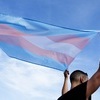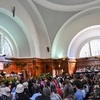UCT Plus recognises rocketing COVID-19 student volunteerism
12 October 2020 | Story Helen Swingler. Photo Adobe Stock. Read time 7 min.
University of Cape Town (UCT) students who have been volunteering at the COVID-19 front lines will now have their efforts formally recognised on their academic transcripts in the form of a COVID-19 Service Leadership Award. 2020 has seen a 300% increase in the number of student societies signing up for UCT Plus, which manages this accreditation programme.
The development is part of the UCT Plus programme, managed by the Careers Service in the Centre for Higher Education Development (CHED). The UCT Plus programme was initiated as a Vice-Chancellor’s Strategic Initiative after being piloted in 2015 and approved by UCT Senate in 2016. This initiative rewards students for their work in elected leadership positions or mentoring and volunteering roles in various arenas by recognising these extracurricular activities as formal accreditations on their academic transcripts.
Since 2017, 774 UCT Plus awards have been added to student transcripts. But this year has seen a 300% increase in the number of student societies signing up for UCT Plus, said Liza Hitge, UCT Plus programme manager.
“We are amazed at how adaptable and creative student leadership has been over the past months.”
“At the initial stages of lockdown, we were convinced that student leadership activities, mentoring and volunteerism would cease in the face of COVID-19 and that the UCT Plus programme would not be able to run this year. Instead we have seen a huge increase in the number of student societies signing up.”
Hitge said that, inspired by the community service medical students were doing at the front line during the first wave of the pandemic, the Careers Service approached the UCT leadership with a request for a special award. The COVID-19 Service Leadership Award was approved by the executive and Vice-Chancellor Professor Mamokgethi Phakeng, who acted for Senate.
Hitge continued: “We are amazed at how adaptable and creative student leadership has been over the past months. Societies engaged their members through social media platforms, webinars and online skills development. Teams collaborated virtually to raise funds for non-profit organisations. Tutees and mentees were supported via WhatsApp.”
Student response fast, far reaching
The student response was fast and far reaching at the medical interface. The UCT Surgical Society especially has been doing an impressive job managing UCT student volunteers in four essential Western Cape COVID-19 projects, said Hitge. These are the 24-hour COVID-19 hotline at the Tygerberg Disaster Management Centre, the Groote Schuur Hospital COVID-19 testing centre, contact tracing and COVID-19 ward duty.
At the Tygerberg Disaster Management Centre volunteers work 12-hour shifts managing queries from the public on COVID-19 symptoms, referring patients to the correct level of care, talking patients through their anxieties and educating callers about COVID-19 and transmission prevention. Some students were involved in dispatching ambulances.
Student volunteers at the Groote Schuur Hospital COVID-19 testing centre worked five-hour shifts; the clinical year medical students (years four to six) are responsible for screening and swabbing patients (to test for COVID-19). They also provide sick notes and compile patient information. All other medical student volunteers (years one to three), Department of Health and Rehabilitation Sciences, master’s and PhD students assist with administrative tasks in the testing centre and transport sample boxes to the laboratory and medication scripts to the pharmacy.
The contact tracing team have had their hands full, given the growing number of COVID-19 cases. Many result from social, work or home contact with infected friends, colleagues or family. All cases and their close contacts are contacted individually to ascertain risk and prevent further infection. The volunteers also advise those who have tested positive on what to do next.
The fifth- and sixth-year MBChB students have been helping in the Groote Schuur Hospital COVID-19 ward. Duties include taking blood samples, putting up drips, being runners for personal protective equipment, oxygen cylinders and other equipment. They also conduct clinical assessments under supervision and update family members in conjunction with the ward’s social work and liaison team.
“COVID-19 is a rare learning opportunity for students to work side by side with healthcare professionals in an epidemic situation,” said Hitge.
Showing their best
The vice-chancellor said that she was overwhelmed by the student response to a critical need, despite the uncertainties of their own academic programmes following lockdown. As committed agents for change and social justice, they represent the best in the country’s youth, she said.
“They’ve focused their creativity, energy and selfless commitment to keep our health services going.”
“These young student volunteers have given their time to help and serve others at a critical time for our country and our world as we have a critical health battle on our hands. They’ve organised themselves quickly and efficiently, using the power of social media to align themselves and act.”
Phakeng continued: “They’ve focused their creativity, energy and selfless commitment to keep our health services going. UCT thanks them. They are inspiring examples of what we can do as a committed community. And we want their academic transcripts to reflect their service to humanity.”
COVID-19 award cycles
Hitge said that given the uncertainty of COVID-19’s progression and the development of an approved vaccine, the COVID-19 Service Leadership Award would be available for front-line volunteers into 2021.
The award cycles are: March to September 2020, October 2020 to March 2021 and April to September 2021.
Surgical Society volunteers who volunteered on the front line between March and September should submit their time sheets to the Surgical Society by 30 October or reach out to UCT Plus at uctplus@uct.ac.za. UCT Plus would also like to hear from other student organisations that are managing student volunteers involved with COVID-19 front-line work.
How to earn an award
What can students do to earn a UCT Plus award?
To earn the award, the hours of students in eligible roles and activities are tracked, verified and submitted. A minimum of 35, 45 and 60 hours volunteered in the role is required for bronze, silver and gold awards, respectively. Participants must also complete a structured and assessed reflection of their activity. This helps students make sense of how they grew from the experience, said Hitge.
“2019 participants gave the reflection activity an 84% approval rating for its support in developing their understanding of the skills, values and knowledge gained through their service.”
 This work is licensed under a Creative Commons Attribution-NoDerivatives 4.0 International License.
This work is licensed under a Creative Commons Attribution-NoDerivatives 4.0 International License.
Please view the republishing articles page for more information.
UCT’s response to COVID-19
COVID-19 is a global pandemic that caused President Cyril Ramaphosa to declare a national disaster in South Africa on 15 March 2020 and to implement a national lockdown from 26 March 2020. UCT is taking the threat of infection in our university community extremely seriously, and this page will be updated with the latest COVID-19 information. Please note that the information on this page is subject to change depending on current lockdown regulations.
Minister of Health, Dr Joe Phaahla, has in June 2022 repealed some of South Africa’s remaining COVID-19 regulations: namely, sections 16A, 16B and 16C of the Regulations Relating to the Surveillance and the Control of Notifiable Medical Conditions under the National Health Act. We are now no longer required to wear masks or limit gatherings. Venue restrictions and checks for travellers coming into South Africa have now also been removed.
Read the latest document available on the UCT policies web page.
Campus communications
2022
UCT Community of Hope Vaccination Centre
On Wednesday, 20 July, staff from the University of Cape Town’s (UCT) Faculty of Health Sciences came together with representatives from the Western Cape Government at the UCT Community of Hope Vaccination Centre at Forest Hill Residence to acknowledge the centre’s significance in the fight against COVID-19 and to thank its staff for their contributions. The centre opened on 1 September 2021 with the aim of providing quality vaccination services to UCT staff, students and the nearby communities, as well as to create an opportunity for medical students from the Faculty of Health Sciences to gain practical public health skills. The vaccination centre ceased operations on Friday, 29 July 2022.
With the closure of the UCT Community of Hope Vaccination Centre, if you still require access to a COVID-19 vaccination site please visit the CovidComms SA website to find an alternative.
“After almost a year of operation, the University of Cape Town’s (UCT) Community of Hope Vaccination Centre, located at the Forest Hill residence complex in Mowbray, will close on Friday, 29 July 2022. I am extremely grateful and proud of all staff, students and everyone involved in this important project.”
– Vice-Chancellor Prof Mamokgethi PhakengWith the closure of the UCT Community of Hope Vaccination Centre, if you still require access to a COVID-19 vaccination site please visit the CovidComms SA website to find an alternative.
Frequently asked questions
Global Citizen Asks: Are COVID-19 Vaccines Safe & Effective?
UCT’s Institute of Infectious Disease and Molecular Medicine (IDM) collaborated with Global Citizen, speaking to trusted experts to dispel vaccine misinformation.
If you have further questions about the COVID-19 vaccine check out the FAQ produced by the Desmond Tutu Health Foundation (DTHF). The DTHF has developed a dedicated chat function where you can ask your vaccine-related questions on the bottom right hand corner of the website.
IDM YouTube channel | IDM website
“As a contact university, we look forward to readjusting our undergraduate and postgraduate programmes in 2023 as the COVID-19 regulations have been repealed.”
– Prof Harsha Kathard, Acting Deputy Vice-Chancellor: Teaching and Learning
We are continuing to monitor the situation and we will be updating the UCT community regularly – as and when there are further updates. If you are concerned or need more information, students can contact the Student Wellness Service on 021 650 5620 or 021 650 1271 (after hours), while staff can contact 021 650 5685.




















